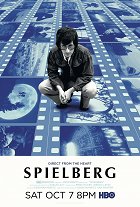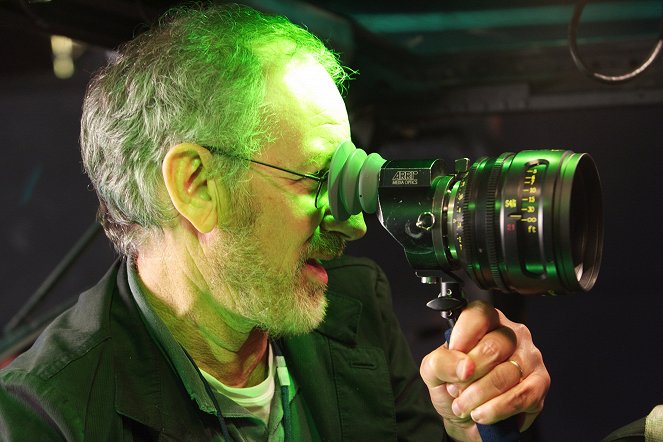Réalisation:
Susan LacyPhotographie:
Samuel PainterActeurs·trices:
Steven Spielberg, Leonardo DiCaprio, Christian Bale, Tom Hanks, Liam Neeson, Harrison Ford, Cate Blanchett, J.J. Abrams, Daniel Craig (plus)VOD (1)
Résumés(1)
Steven Spielberg has built an unrivaled catalogue of groundbreaking films over the course of his nearly 50-year career. Charting the evolution of this iconic figure, award-winning documentarian Susan Lacy draws on nearly 30 hours of exclusive interviews with the director, who opens up about his bittersweet childhood and lifelong obsession with moviemaking, his precocious early work as a TV "wunderkind," his rise to fame through an incredible string of blockbusters, his later forays into more serious dramatic films, and the personal and professional relationships he's cultivated through the years. Spielberg also includes insights from members of Spielberg's family, as well as friends and colleagues, plus clips and behind-the-scenes footage from many of his milestone films. (HBO Europe)
(plus)Critiques (3)
Formalistically, Spielberg is a conventional documentary interspersing talking heads with scenes from films and the production thereof and offering a chronological overview of Spielberg's filmography. This is expanded on the vertical axis with a look into his childhood. Despite the extensive runtime, it falls far short of covering all of his films. Unsurprisingly, the films that received a largely positive reception at the time of their release predominate (there is no mention of Always, Hook, The Lost World or Amistad) and reflect the themes that, at least according to the documentary’s creator, are determinative for Spielberg (democracy in Lincoln, the father-son relationship in Catch Me If You Can, the struggle against terrorism in Munich). ___ Lacy chose a similar interpretive key as Molly Haskell’s recently published Spielberg biography, only less critical: She explains the choice and handling of certain themes through the influences that shaped Spielberg’s childhood (fear of the unknown, the divorce of his parents, his Jewish origins). Thanks to this, she succeeds in conveying Spielberg’s personal life without losing sight of the films that comprise the main reason for the documentary. ___ The tone is predominantly adulatory (with the exception of The Color Purple, which is referred to as “fake and Disney-esque”), but without pathos and unnecessary repetition of previously spoken words of praise (for example, we don’t hear over and over again that Spielberg is a great father who knows how to direct children). Furthermore, most of the speaking is done by Spielberg himself, who rather than talking about how he used to pick up girls in his youth (we learn about that from Brian De Palma), talks about the structure of the story and the technical handling of specific scenes, and his words basically confirm what most of those involved in the film say about him (Martin Scorsese and Janet Maslin offer the most insightful observations) – he has extraordinary storytelling talent and the ability to convey meaning through imagery, and he almost instinctively understands how to approach a scene in order to make it both comprehensible and attractive for the viewer. ___ If you, as a Spielberg fan, have seen the “making of” most of his films or Richard Schickel’s documentary about him, you won't learn much new from Spielberg, but you will be reminded of what makes the man unique, thanks to people who are a pleasure to listen to. Like me, you will also most probably get goosebumps during the segments showing his films’ famous moments underscored with John Williams’s music. In the context of the chosen concept and the focus on a broader audience, this is a satisfying work, but if someone in the future makes a more formalistically or interpretively daring documentary about the master, I would not be upset about that. 80%
()
Such a long and yet such a brief documentary, isn’t it? Spielberg fans won’t learn too much in the way of new information (aside from the part about the Spielberg-Lucas-Coppola-De Palma-Scorsese directorial team, what interested me the most was everything about Spielberg’s parents). It would be better as a multi-part series, but what can you do – still, it’s a worthy tribute to a great director.
()
It's rather telegraphic and we don't really learn much about the individual films, but as a tribute and personal portrait of the greatest Hollywood classic of our time, it's beautiful and outrageously inspiring. Good-old Spielberg is a role model for all of us, a deep bow and respect.
()

